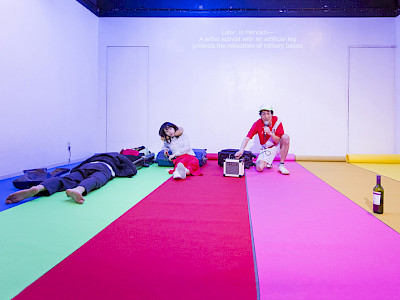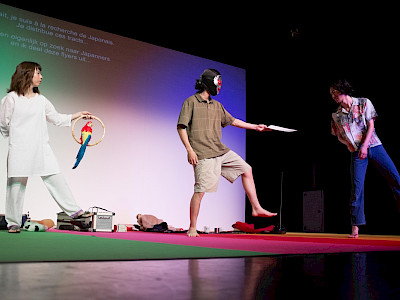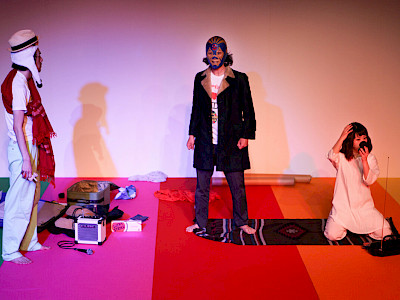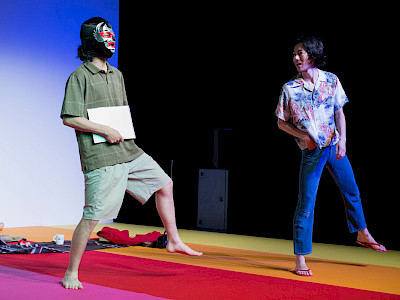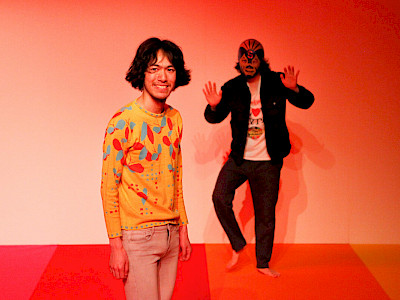23 — 28.05.2016
Yudai Kamisato / Okazaki Art Theatre Kawasaki / Tokyo
+51 Aviación, San Borja
theatre
Japanese → NL, FR | ⧖ 1h15 | € 16 / € 13
Yudai Kamisato directs the Okazaki Art Theatre and is the pacesetter of a young generation of Japanese theatre makers. In 2016 he is coming to Europe for the first time, with an inspired piece that delves into the roots of his existence. Kamisato is of mixed Japanese-Peruvian descent, and his piece, +51 Aviación, San Borja, refers to the address of his Peruvian grandmother in Lima. It looks back on his move to Japan at an early age, a ‘homeland’ where he had never before been, and on a trip to his South American birthplace when he was older. Kamisato sees the nikkei (Japanese emigrants) as a mirror that shines a light on Japanese society today. In this pseudofictive reportage, he traces an intercultural history across the Pacific Ocean. Like a contemporary Odysseus, the main character wanders into strange places, colourful encounters, and absurd events, until the web closes around his own mixed identity. A discovery.
About the piece
Born in Lima, Peru, Yudai Kamisato is the director of Okazaki Art Theatre. His attitude toward political and social issues is clearly manifested in his work; he continues to address the theme of symbiosis among people who cannot fully understand each other. Kamisato is one of the most talked-about artists in Japan’s contemporary theatre scene; he has taken part in Festival/Tokyo for three consecutive years and was invited to participate in the Taipei Arts Festival.
The latest piece revolves around the concept of imin (immigrants), a key word relating to his own origins, and a theme he has frequently taken up. Solidly grounded in actual investigative work, the narrative unfolds around places he visited and encounters with the people there, as if to retrace his roots. More specifically, it moves from Tokyo, where he is currently based, to Okinawa, where his father is from, and then from there to the Japanese-Peruvian community in Lima, where his grandmother, an Okinawa native, still lives.
But that is not all. Along the way, the audience also becomes acquainted with some engrossing but little-known personages. For example, the piece references the life of Seki Sano, a dramaturge known as the ‘father of Mexican theatre’, who was active in the shingeki ‘new drama’ movement in pre-war Japan but was in effect driven out of the country for so-called thought crimes. There is also an encounter with Ryoichi Jinnai, an entrepreneur who, while attracted to the prospect of immigrating, elected to remain in Japan and is still providing support to communities of Japanese heritage in Peru and other South American countries. The work therefore not only follows Kamisato’s own odyssey but also incorporates happenings and utterances from the sagas of other individuals.
As such, it must be termed a challenging and multi-layered meta-theatre, boldly darting back and forth between reportage and fiction. In the communities founded by Japanese emigrants who left the land of their birth and did their best to build a new life in a new country by making use of the institution of immigration, Japan still exists as ‘the old home’. And what is the difference between the Japan experienced by Kamisato in his life and work in the theatre in Tokyo and the Japan he has seen in the immigrant community of Lima? Showing us plural images projected through a kind of reverse irradiation, the piece actually tasks us to look at our present life – and ourselves.
Playwriting, direction & stage design
Yudai Kamisato
Performers
Masahiko Ono, Wataru Omura, Mari Kodama
Lighting
Ryoya Fudetani
Sound
Masashi Wada
Stage manager
Ayumu Okubo
Dramaturgy
Hinako Arao
Producer
Akane Nakamura
Production management
Yoko Kawasaki, Megumi Mizuno
Presentation
Kunstenfestivaldesarts, Les Brigittines
Production
Okazaki Art Theatre, precog
Special thanks to
KAKIKUUKYAKU, Shochiku Geino, The Japan International Cooperation Foundation
Supported by
Arts Council Tokyo (Tokyo Metropolitan Foundation for History and Culture), The Saison Foundation, Agency for Cultural Affairs Government of Japan

